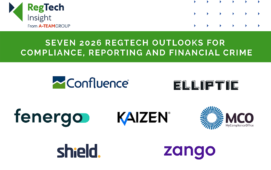Thomson Reuters has set up a managed service designed to help financial institutions and their clients comply with Know Your Customer (KYC) requirements. Called Accelus Org ID, the service aims to increase the efficiency and reduce the cost of compliance by providing accurate, up to date identity data and avoiding the need to repeat the client on boarding process every time a relationship is made between a buy-side client and sell-side firm.
Accelus Org ID is in production and ready for sale following a beta trial and adoption by Thomson Reuters Transaction Services, a provider of foreign exchange brokerage services. Tradeweb Markets, an affiliate of Thomson Reuters and a provider of fixed income and derivatives marketplaces, is expected to be the next commercial customer.
The service builds on Thomson Reuters’ World-Check risk screening solution and other point solutions for KYC, and has been developed in partnership with sell-side banks, buy-side firms and regulators from key financial markets around the world.
Jan-Coos Geesink, senior vice president of risk at Thomson Reuters, explains: “Driven by customer requests, we began to research a managed service for KYC information at the beginning of 2013. By the end of the first quarter, we had a plan and started to build, but one component we didn’t have was a platform, so in the third quarter we acquired GoldTier, a New Jersey based company providing a framework including all the processes of KYC. We continued to sell the platform as a point solution and will continue to do this, but also used it as the base on which to build the managed service.”
Accelus Org ID supports client on boarding, risk categorisation and risk screening, which is achieved by creating accurate identity documentation that can be screened for high risk money laundering characteristics, negative news flows and sanctions issues. The service provides a portal to buy-side clients that is populated with entity data already held by Thomson Reuters. Buy-side clients can then upload documents and validate the accuracy of the data before allowing their files to be accessed by selected sell-side firms. Geesink comments: “This speeds up client on boarding and avoids repetition of the process.”
The service is available globally in 63 languages and delivers data as a feed to customer systems in a format of choice. It will be continuously updated by Thomson Reuters to support regulatory requirements for ongoing maintenance of client identity data and will initially meet the KYC requirements of rules and regulations including Anti-Money Laundering, the Foreign Account Tax Compliance Act, Dodd-Frank, European Market Infrastructure Regulation and the Markets in Financial Instruments Directive. Going forward, Thomson Reuters will work with a governance group of financial services professionals and key clients to decide the scope of the service in terms of which emerging regulations it should support and what their requirements are for KYC data and documentation.
Summing up the need for Accelus Org ID, David Craig, president of Financial and Risk at Thomson Reuters, says: “Regulators see the health of a firm’s KYC standards and how these are consistently applied across business as the first step in winning the fight against money laundering and the financing of crime and terrorism. Failures in this area bring both serious financial and reputational cost to firms. Thomson Reuters is working with the industry to improve operational efficiency, enhance the end client experience and reduce costs for clients and the financial institutions that serve them.”
Subscribe to our newsletter




